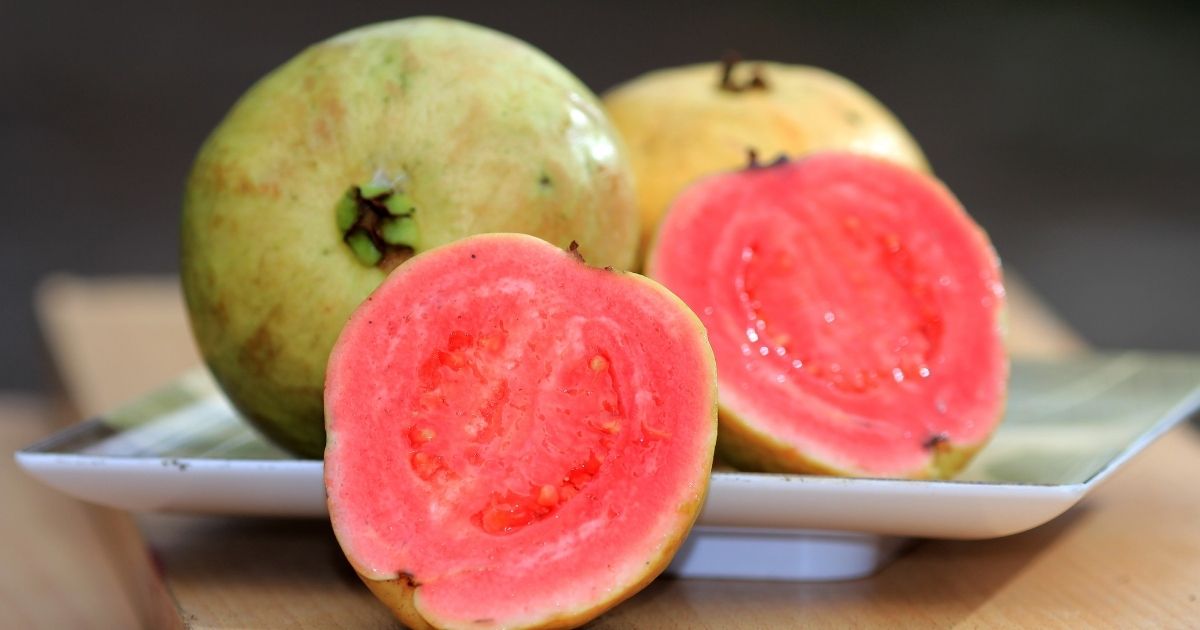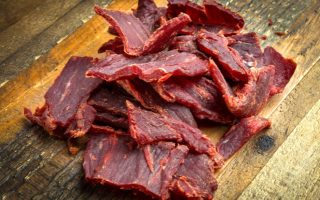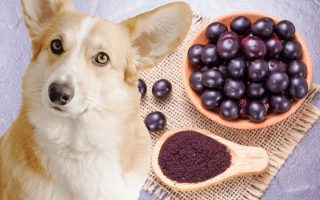Dogs and fruits have both cordial and non-cordial relationships. Some fruits are healthy for dogs; others pose health hazards.
Some need to be fed moderately, and others they can devour as much as possible.
Guava is an exotic fruit—some species come with green skin and pink flesh. It’s a nutritious fruit for humans that is rich in vitamins and minerals.
However, is it safe to be added to your dog’s diet?
This article covers everything you need to know in regards to the question: Can dogs eat guava? Read on!
Is Guava Safe for Dogs?
The answer is yes, dogs can eat guava.
Guavas are safe and edible for dogs to consume. Nonetheless, as with almost any other fruit, guava should be moderately fed to dogs as it is a very nutritional fruit.
There are plenty of natural sugars and carbohydrates in guava, which is beneficial to your dog’s health.
Guava fruit is grouped into the plant family known as the “Myrtle.”
Typically, myrtles are not harmful for dogs to consume. Most fruits are good for dogs to eat but should be given in little proportions, and that includes guava.
A piece of guava fruit is enough for your dog. They are filled with enough minerals and vitamins for your dog.
It would be best if you did not feed guava to your dog more than once a week.
If you are feeding a large dog, you can be relaxed a bit on the proportion of guava you are feeding it.
However, for small dogs, you should be very moderate in the quantity you feed to them as they are more likely to develop gastrointestinal disorders.
What about ripe guava—is it safe?
Ripe guava is safe for dogs to eat. But how can you tell if a guava fruit is ripe? Ripe guava fruit is typically soft than an unripe one and will bulge a little under a light squeeze
Also, they’re a lighter shade of green than the unripe ones that are a darker green.
Is dried guava good for dogs?
Dried guava is edible and safe for dogs to eat. They should be eaten moderately as the dried fruit contains a higher quantity of sugar.
Can Dogs Eat Guava Skin?
From our findings, guava skin may be a bit difficult for pups to digest.
When feeding guava to your dog, you should peel the skin and feed only the ripe fruits to your dog and do well not to forget to feed in small quantities.
Can Dogs Eat Guava Seeds?
Generally, it is not wise to feed the seed of any fruit to your dog. Fruit seeds usually contain a chemical substance known as cyanide.
Cyanide often prevents body cells from using oxygen, thereby killing the cell and resulting in death.
You do not want this for your pet; hence on no account should you feed the seed of guavas or any fruits to your dog, notwithstanding the size of your dog.
Also, seeds can cause digestive complications in your dog, further reasons to avoid feeding it seeds.
Little seeds eaten by mistake should not be a problem, but there would definitely be health complications when large quantities of seeds are consumed.
Can Dogs Eat Guava Leaves?
There’s this report making round stating that boiling guava leaves and drinking as tea is medicinal. The authenticity of this report has not been verified.
However, it would be best if you did not feed guava leaves in itself or even as a tea to your dog. It could upset their stomach.
Can Dogs Eat Guava Paste?
Homemade guava paste, also known as “Gioabada,” is not advisable to be fed to your dog. Guava paste often contains a lot of sugar, which could adversely affect your dog’s blood sugar.
Health Benefits of Guava for Dogs
Guava has a lot of nutritional benefits to both humans and animals. The fruit is greatly rich in minerals and vitamins and boasts of containing all the health benefits suitable for the well-being of your dog.
Below is an elaborated list of important nutrients filled in the guava fruit.
1. Vitamins A and K
Vitamin A is a fat-soluble vitamin that aids cell improvement and immune function in dogs; also, it plays a role in the functionality of a dog’s reproductive system.
Vitamin K improves a dog’s bone health and aids the balanced formation of blood clots.
Overall, both vitamin A and K are essential for stimulating good metabolism in dogs.
Dogs suffering from a deficiency in vitamin A should consume more guavas but at a moderate level.
2. B-vitamins
B-vitamins are important for producing neurotransmitters in a dog’s brain.
Guava fruit provides the right proportion of B-vitamins to stimulate the production of neurochemical synthesis in dogs.
3. Vitamin C
Vitamin C is another vital nutrient the guava fruit has to offer. Vitamin C acts as an immune booster in dogs, especially lactating and pregnant ones.
Sometimes sick dogs may need an external addition of Vitamin C as a result of their body’s inability to produce it due to being sick; in such cases, consumption of guava is a necessity in the path to recovery for such dogs.
The importance of Vitamin C to a dog can only be overemphasized. This vitamin fights off all hazardous elements in a dog’s body, acting as antioxidants against harmful external viruses.
Dogs suffering from bacteria infection, abscesses, or kennel cough will benefit from vitamin C consumption.
Vitamin C also helps in the treatment of hip dysplasia and reversing spinal disorder. It is a body strengthening aid in dogs.
4. Iron
As with any living animal, dogs need a balanced diet to suck in all essential nutrients. Iron is another standout nutrients the guava fruit offers.
Hence, feeding guava to your dog will add properties of iron to its body which in its effect helps in the formation of hemoglobin and red blood cells in a dog’s system.
5. Fiber
Fiber is another beneficial nutrient guava fruit offers to dogs. Guava contains fiber which helps improve and nourish a good digestive system.
Although dogs don’t really need another external dose of fiber, it still has its benefits.
6. Sodium
Sodium is yet another mineral element present in guava, and it aids a balance regulation of blood pressure. However, it works when guava is moderately fed to your dog.
You feed it less, and you won’t notice its effects. Due to its volatility risk when not moderately fed to dogs, Vets do not recommend giving dogs any form of sodium supplements in a bid to avoid the risk of irregular blood pressure.
7. Potassium
Potassium is very helpful in the upkeep of a dog’s systems and, more importantly, improves muscle growth.
Potassium helps to break down fats and carbs, thereby making for a better digestive system.
Other benefits of potassium include regulating PH levels, strengthening a dog’s cognitive function, and improving organ functions.
Guavas contain a considerable quantity of potassium.
8. Magnesium
Magnesium acts as a relaxant for dogs in physical pain. This nutrient element takes in excess potassium and zinc in a system and regenerates muscles.
For a healthy and functioning heart, digestive tract, and liver, magnesium plays a crucial role.
Other mineral elements present in guava that are beneficial for the all-around health of your dog include calcium, phosphorus, lycopene.
How to Feed Guavas to Dogs?
When feeding guava to your dogs, ensure you pay attention to your dog’s guava intake to either limit its intake or encourage it to eat more depending on the quantity you reckon you should feed your dog.
Some dogs may love the guava fruit, others may not like and will require feeding it to them only for the nutritional benefits.
Below is a step by step guide to properly feed guava to your dog:
- Wash the fruit well
- Dice the fruit into small pieces
- Peel off the skin and remove the seed as well
- Feed only the pulp of the fruit to your dog. However, if its a medium or large dog, you may feed it the skin. It does not pose any health hazard.
- It is best to hand-feed guava to your dog; otherwise, they might make a mess of it.
- For smaller dogs, 1-2 bite-sized guava twice a week is enough. For bigger dogs, one whole guava a week will do just fine.
If your dog resents eating guava but needs to be fed it for the nutritional benefits, you could mix it up with its favorite chew.
Guava also can serve as a fruit treat during training with your dog.
When feeding your dog a new food for the first time, it is advisable first to give them a small quantity and observe if they’re allergic to it or experiencing any form of digestive complications.
What other Types of Guava are Safe for Dogs?
- Red Guava: Red guava has a strawberry-like taste and has a red skin rather than the usual green skin for most guava fruit. They are safe for dogs to eat but in moderation.
- Can dogs eat White Guava? Also known as “Mexican white guavas,” they are safe for dogs to eat.
- Thai Guava: Also known as ‘farang’ in Thailand, it’s almost no different from the regular guava fruit. It is green and crunchy in texture and safe for dogs to eat. However, it should be consumed in moderate quantity.
- Apple Guava: Apple guava looks a lot like lime. It is safe for dogs to eat but only when ripe.
- Pineapple Guava: Pineapple guava is a prevalent fruit in Southern America. It is popularly known as Feijoa. It is safe for dogs to eat but only when ripe and should be fed moderately to them.
Is guava poisonous to dogs?
It’s a common question, but guava is not toxic to dogs when given in small quantities. The fruit has been tested on various animals and guava has been found to be safe for dogs.
What happens if my dog eats a guava?
If your dog eats too much guava and it makes the dog sick, you should take your canine to the vet immediately. However, If it does not make your dog sick, but you want to make sure they are okay, it is good to have them drink a lot of water.
Wrap Up
In conclusion, when feeding guava fruits to your dog, it is advisable to feed only the flesh of the fruit and cut of the skin, seed, and leaves.
As much as guava is good and edible for dogs to eat, some may not like it and reacts differently to it. This is not strange.
If your dog is vomiting or having diarrhea, you should quit feeding it guavas. There are tons of other nutritionally beneficial fruits that they can eat.







